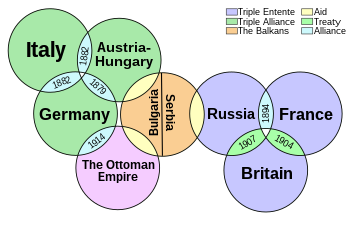marathag
Banned
Why wouldn't they? The motion setting both Russian and France against Germany was set by by the Russian Mobilization against both A-H and Germany.nly what happens in July 1914 AH and Germany instead of seeing the alliance system as a deterrent they start seeing it as way to get an advantage they can use and convince themselves that they can beat France and Russia if it comes to it, and if it come now it's better then it coming later
So there was to be War, and Germany was hoping for a quick fight against France, to get them to sue for Peace, and then have undivided attention against Russia, the slower of the pair and then get peace treaty out of them.
Now I've not made a secret that going into France thru Belgium was a huge blunder, but that's with over a hundred years of hindsight.
So while I don't condone it, I understand it.
The value of alliance to deter war, that fell apart with the Russian desire to back their odious South Slav minion, that had no defense treaty with anyone, by Mobilization against A-H and Germany.
Russia also expected a short War, with them parading thru Brandenburg Gate before the snow fell.
